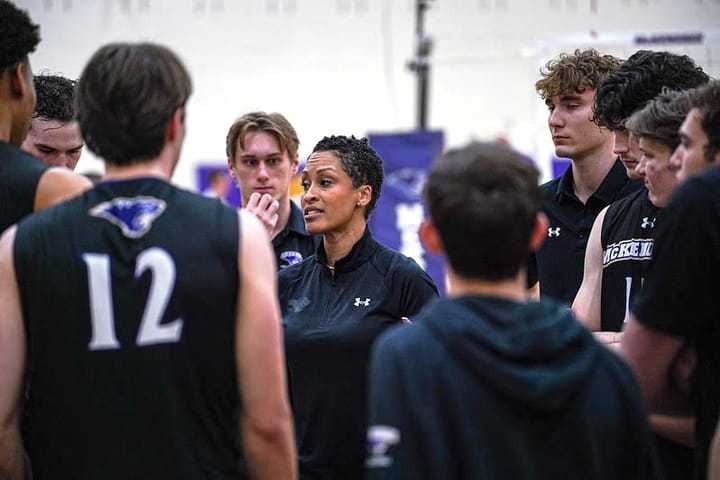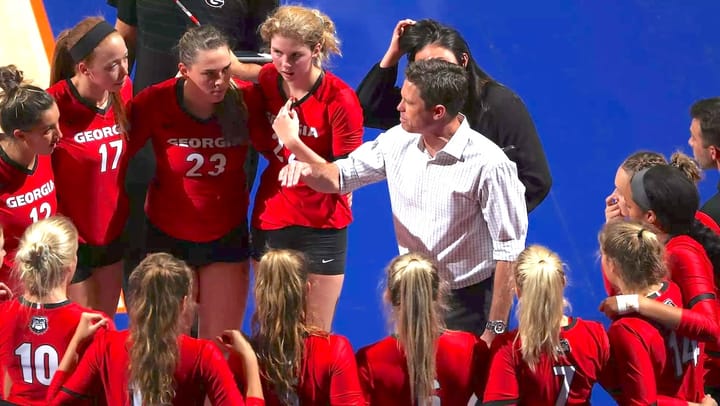72. Keegan Cook: We are what they learn.
Keegan Cook is the head coach of the University of Minnesota's volleyball team. He brought his expertise over from the University of Washington, where he was the head coach from 2015 to 2022.
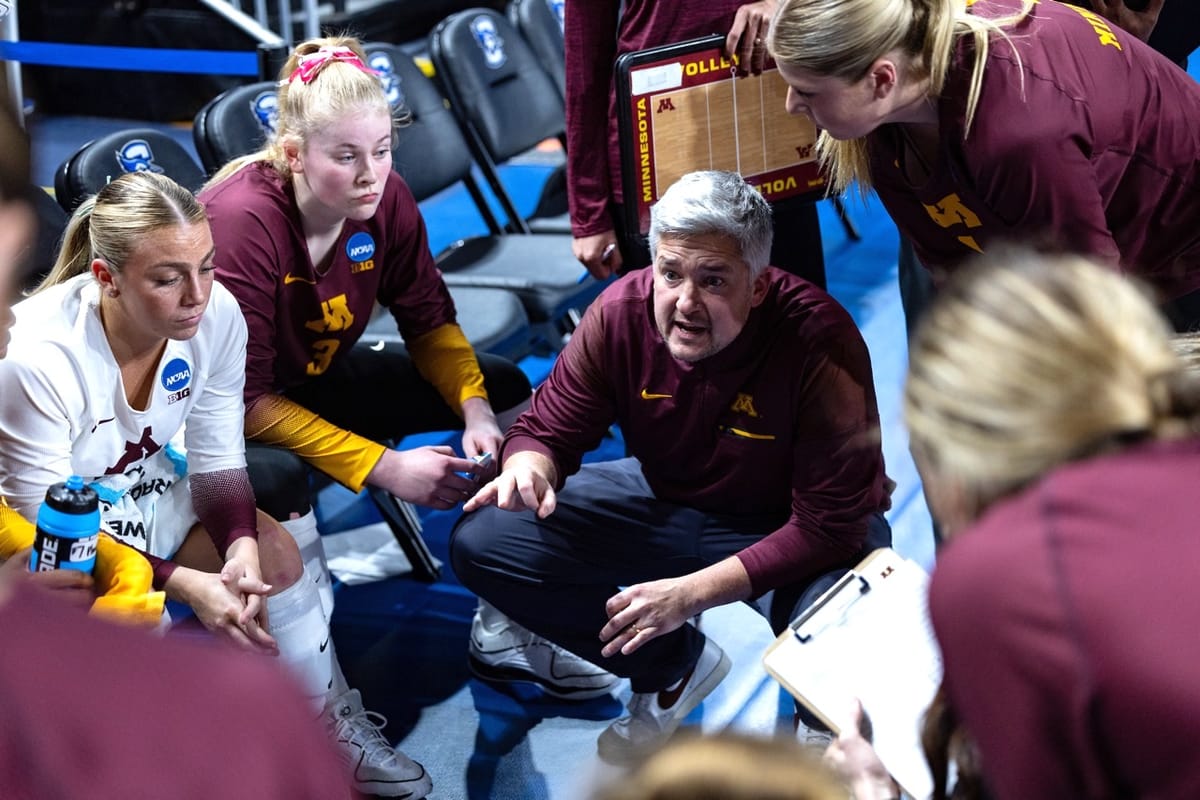
Under Keegan's leadership, Washington's women's volleyball team clinched four Pac-12 conference titles and had an impressive final-four appearance in 2020.
Coach Cook has been recognized with multiple accolades, including the Pac-12 Coach of the Year in 2020 and was the AVCA Board President throughout 2022 and 2023.
In this Masterclass Keegan talks about:
- Advice that’s crucial to coaches starting out
- Your ability as a coach to handle issues and problems
- Why it’s important to increase the speed of information in your program
- How the transfer portal is a mirror of the underlying decision-making
- How simple rules lead to complex and intelligent behavior
- Being redundant with your communication
- The benefits and the created new danger of lean second contacts
- The simple, but powerful effect of compound interest in volleyball and life
- And so much more...
We've got 17 video clips (55+ minutes) and over 8400 words in Coach Cook's Masterclass. Sit back, relax and soak it all up. Enjoy!
Before we get this started a big thanks to Keegan for his availability.
Why did you decide to commit to being a professional volleyball coach? What pushed you towards that decision?
The most impactful moment was when I was in university. As a university student, I was coaching and I got connected with a coach named Rob Browning, who was with the men's national team. He was a technical director. He got hired at my university, St. Mary's College of California, I was friends with some of the players on the team and had helped out at times in the gym, shagging balls.
I was a math major at the time, an aspiring math major, and Rob had a very high technical background. Data Volley was still relatively new back then. And he met me, handed me Data Volley, and said, "This is Data Volley, we'll see you tomorrow at practice." He just gave me the program, and I started playing around with it.
Something about it connected with me, tapping into the analytical side of who I am.
I was probably in my 3rd year of university, coaching youth club on the side, and working with the university team.
I was struggling with my upper-division math courses, such as linear algebra and abstract geometry. They were no longer tangible but very theoretical, writing proofs. One day, one of my professors, who I was close with, said, "Keegan, I don't really think you're a math major. I think you're an arithmetic major," which was a bit of a joke slash insult, implying this was not what I was meant to do.
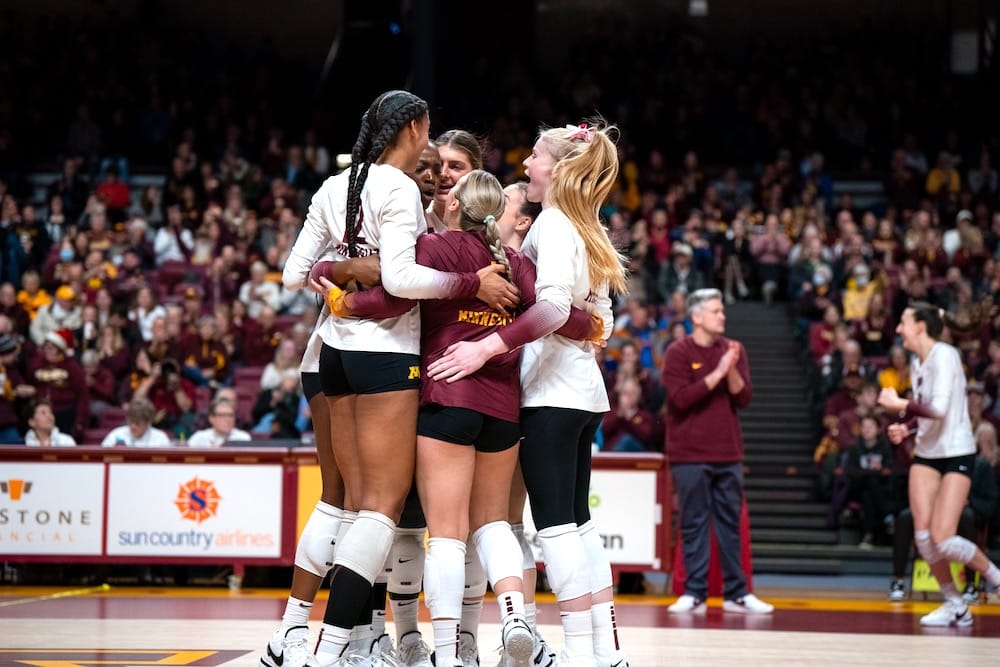
I was already too far ahead. I finished my degree early and started taking as many sports management classes as I could because that's where my passion was.
I was coaching all day at university and then all night I would coach youth club teams. As I prepared to graduate, I graduated on a Friday and started work on a Monday at my university because they had a position open up.
Here I was, a 22-year-old coaching 21-year-olds. I couldn't have started any earlier. I originally wanted to be a math teacher coaching youth volleyball, but then I realized I didn't want to be a math teacher or coach high school volleyball.
I did want to teach, and I was going to teach volleyball. This was going to be my medium. And I just started very quickly.
What advice would you give yourself as a starting coach? An advice that is so clear and logical for you now, but that you had to develop over the years.
That's a good question. It's easy to give advice to other coaches, but when you frame it that way, what advice would I give myself?
Probably not to worry so much. I think as a young person, you've got a good degree of anxiety about the future and what's next. I've probably spent an inordinate amount of energy worrying about the future. It made me passionate about the work I was doing. I tried to do a great job, but I probably lost more nights of sleep than I needed to.
Things have worked out okay, professionally and personally, but in those years of your life, from 22 to 30, there's a good degree of anxiety and worrying as opposed to just settling in and doing the work.
Not being so future-oriented with your mindset. I think that's advice I would give to any coach or myself because it did work out alright.
Being more present "where I am, when I am" is advice I give to young people and young coaches all the time.
Thankfully, as you get into your thirties, I think some of that anxiety goes away, and you get a sense of what really matters. But that's what I remember about those early years.
Matias: That knowledge came to you through experience, or did it also come from people close to you?
I always think the most important wisdom, if you want to call it that, comes from really difficult moments. One important moment for me, I remember, was when I was talking to Marv Dunphy, someone I greatly respect.
I was following Jim McLaughlin at Washington, which was a big jump, and things were not great in the first six months. Players were failing classes, there were rumors about players leaving, and some players were being difficult. I was sharing these complaints with Marv, and he said, "Ok, you know you're paid to get bad news, right?" It was a very transformative moment for me in terms of how I looked at what a head coach or anybody in a position of leadership's job is.
Their job is to receive bad news and respond to it well for the athlete, for themselves, and for the program.
In that moment, when difficult things would happen or bad things would happen, I no longer viewed them as failures on my part but just opportunities to respond. I think that was a very formative moment for me.
Receiving bad news well is a very important skill for people in positions of leadership. That was something really helpful for me. Then I stopped worrying about bad things happening. Adversity will find us in a million different forms, and how we meet that adversity each time and what it says about us in the way we respond to it has been important.
Matias: Stoic literature became mainstream over the years. This is exactly that. Focus on everything that is in your control, but also be great at spotting what isn't and let it go from a total bandwidth point of view.
It's funny you bring up stoicism. It relates to the question you asked about what book I've been reading most, and I've been reading more of Marcus Aurelius and Seneca than ever before. Just how we respond to unfortunate events and what really gives meaning to our work, I've found myself reading more of that in recent years than ever before.
There is one part of receiving bad news well that I think coaches need to know, especially when athletes come to you, young athletes with a problem. That experience is very intimidating for them.
Athletes sit with it, and they imagine the scenario and how you're going to react. It takes them one day, two days, one week, one month to finally come talk to you. And in that moment, if it goes well, if you receive it well, then the next time, it'll take them half the time to bring you the problem, and the next time, half the time again.
All of a sudden, you have a team and an organization where information moves very quickly.
But if the first time they come to you with a problem, your reaction is a negative one, the speed of information is going to slow down within your organization. It doesn't mean bad things are happening; it just means it's taking longer to reach you to find solutions.
So, that's something that I think is really important for any head coach working with young people. We're used to getting bad news, but for them, it's such an intimidating experience that if it doesn't go well, they might never come back. And now you're in some big trouble, I think.
So, that's another important aspect of it.
What are common mistakes you still see in coaching volleyball?
There are two mistakes that I think exist on the same spectrum. The first one being, young coaches, young people are very eager to get the next job or do the thing that they're not doing.
They have these delusions of grandeur about, "Oh, I'm the second assistant, but the first assistant gets to do the recruiting," or "I'm the first assistant, but the head coach gets to make the decisions."
And so, they're always looking to what they're not doing and they want to move quickly through the coaching ranks. They're very ambitious, but what happens is they eventually find themselves in a position where they can't do the job they've been hired for. They move too quickly.
And it's amazing, there's been a lot of opportunity, a lot of change in NCAA volleyball. And there are a lot of assistant coaches who have never coached as a head coach even in the youth system. They've never had to manage a roster or do tryouts or make cuts or deal with parents.
We love us some mic'd up footage
They may have deep playing experiences, but they haven't actually coached very much, and they're in very high-level positions, it amazes me. So, I think that's a mistake I worry about for young people, that they try and advance too quickly instead of building their own skill sets.
Then, on the other end of the spectrum, I see a lot of very talented young people with good character, good integrity, good work ethic. They'll say things like, "Oh, I'm just not ready yet. I'm not ready to do this."
You're never ready for the job you don't have. You're never ready until you're in that job.
I just see those mistakes being made on both ends, right, where people are advancing too quickly or thinking about advancing too quickly, or they're advancing too slowly and they're not pushing themselves outside their comfort zone.
So, to find yourself in the middle of those two things, I think, is a skill that young coaches need to find.
Do you have a particular goal? Maybe a goal that you already reached or a goal that is so hard to reach that it gives you daily motivation?
One thing that attracted me to the position at Minnesota is the opportunity to do something that had never been done before in terms of winning a national championship at this university.
It was maybe the only thing about my previous position that I couldn't say, you know, Jim McLaughlin had won a national championship at Washington, so it had been done.
Minnesota has a tremendous coaching pedigree, in Hugh McCutcheon and Mike Hebert, but there was something left to be done. I think that's attractive to anyone, the concept of doing things that haven't been done is special.
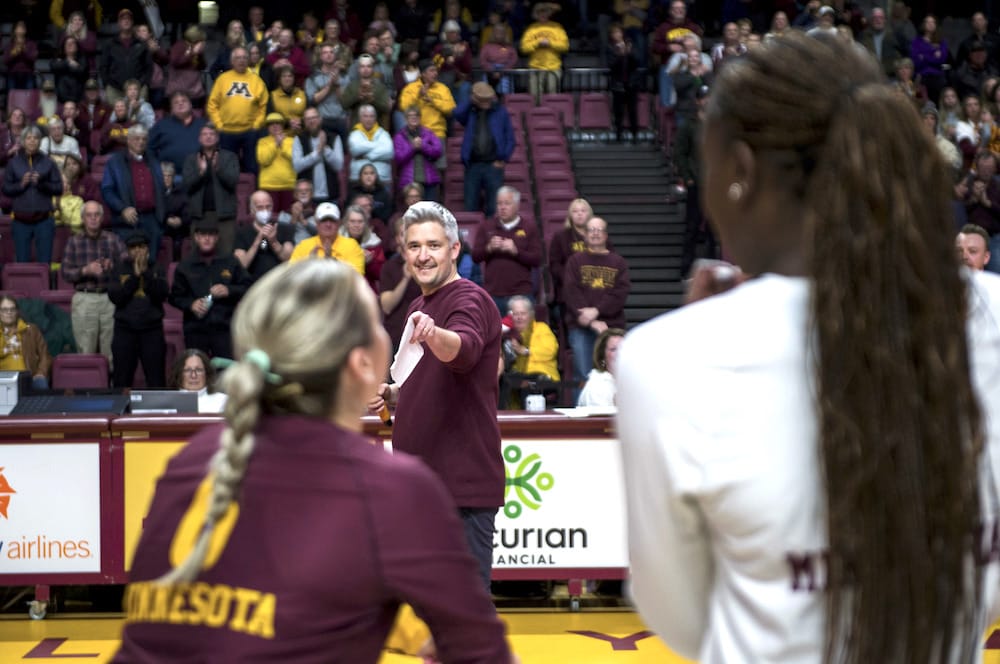
But really, if you've won enough, which I'm sure you have, you know that not all wins carry the same meaning.
Just winning a certain way with a certain kind of person, giving a student-athlete a certain kind of experience that is transformative for their life is the greatest experience that coaching can offer.
To get a phone call from a player five years later, or to see them succeeding professionally on the court or off it, there's just no substitute for that kind of accomplishment.
The more of those relationships I have with players, the more of those experiences where they feel and I know that we've impacted the course of their life in a positive sense, there's just no comparison to that in coaching.
But it's hard to have that kind of experience with a student-athlete in just four years.
In four years, or less even. This is a nice segue to spend a bit of time on NIL and the transfer portal and how this changed and is changing college sports.
No, it's a topic that everyone has talked about, and it's one that I've reflected on. In my time at Washington, talking about things changing fast, I spent eight years at Washington. I never had one player transfer or quit.
